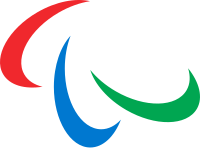Our website is made possible by displaying online advertisements to our visitors.
Please consider supporting us by disabling your ad blocker.
Paralympic Games
| Paralympic Games |
|---|
 |
| Main topics |
| Games |
| Regional games |
| Disability |
|---|
|
|
The Paralympic Games or Paralympics is a periodic series of international multisport events involving athletes with a range of disabilities. There are Winter and Summer Paralympic Games, which since the 1988 Summer Olympics in Seoul, South Korea, have been held shortly after the corresponding Olympic Games. All Paralympic Games are governed by the International Paralympic Committee (IPC).
The Paralympics began as a small gathering of British World War II veterans in 1948. The 1960 Games in Rome drew 400 athletes with disabilities from 23 countries, as proposed by doctor Antonio Maglio. Currently it is one of the largest international sporting events: the 2020 Summer Paralympics featuring 4,520 athletes from 163 National Paralympic Committees.[1] Paralympians strive for equal treatment with non-disabled Olympic athletes, but there is a large funding gap between Olympic and Paralympic athletes.[2][circular reporting?]
The Paralympic Games are organized in parallel with and in a similar way to the Olympic Games. The IOC-recognized Special Olympics World Games include athletes with intellectual disabilities (although since 1992, people with intellectual disabilities also participate in the Paralympic Games), and the Deaflympics held since 1924 are exclusive for deaf athletes.[3][4]
Given the wide variety of disabilities of Para athletes, there are several categories in which they compete. The allowable disabilities are divided into ten eligible impairment types: impaired muscle power, impaired passive range of movement, limb deficiency, leg length difference, short stature, hypertonia, ataxia, athetosis, vision impairment and intellectual impairment.[5] These categories are further divided into various subcategories.
- ^ Dehghansai, Nima; Lemez, Srdjan; Wattie, Nick; Baker, Joseph (January 2017). "A Systematic Review of Influences on Development of Athletes With Disabilities". Adapted Physical Activity Quarterly. 34 (1): 72–90. doi:10.1123/APAQ.2016-0030. PMID 28218871.
- ^ Vritika (2017-04-25). "Difference between Olympics and Paralympics". www.differencebetween.info. Archived from the original on 2021-09-08. Retrieved 2021-09-08.
- ^ The World Games for the Deaf and the Paralympic Games Archived 2014-03-15 at the Wayback Machine, International Committee of Sports for the Deaf (CISS), December 1996
- ^ Special Olympics and the Olympic Movement, Official website of the Special Olympics,1669
- ^ "Classification". Official website of the Paralympic Movement. Archived from the original on 2014-03-16.
Previous Page Next Page


